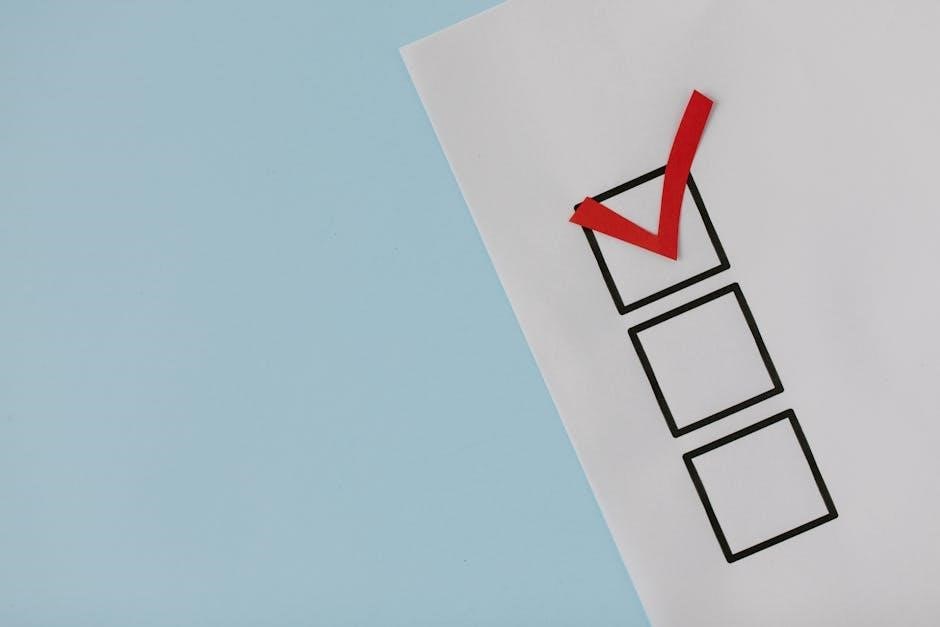A Death Checklist PDF provides a structured guide to navigate the complex process after a loved one’s passing, covering legal, financial, and funeral arrangements efficiently.
1.1 Understanding the Importance of a Death Checklist

A death checklist is essential for streamlining tasks after a loved one’s passing, helping to reduce stress and ensure no critical steps are overlooked. It guides users through notifying friends, managing financial affairs, and organizing personal documents, providing clarity during an emotional time. By addressing legal, funeral, and estate matters, it offers a structured approach to navigating complex processes with confidence and peace of mind.
1.2 Key Features of a Comprehensive Death Checklist
A comprehensive death checklist includes essential steps like notifying loved ones, securing financial assets, and organizing funeral arrangements. It also covers legal requirements, document gathering, and estate distribution. Additional features may involve managing digital presence, handling cultural practices, and offering emotional support resources. These elements ensure a streamlined process, helping individuals navigate challenging tasks with clarity and confidence during a difficult time.

Legal and Financial Considerations
Securing financial assets and notifying employers is crucial. Handling benefits, estate planning, and inheritance ensures legal and financial matters are addressed efficiently after a loved one’s passing.
2.1 Essential Steps to Take Immediately After Death
Immediately after death, secure legal documents like the death certificate, notify authorities, and contact employers for benefits. These initial steps ensure a smooth process for legal and financial matters.
2.2 Managing Financial Affairs and Assets
Managing financial affairs involves identifying and securing assets, reviewing estate plans, and handling debts. This ensures proper distribution of the deceased’s estate according to legal and financial guidelines, providing clarity for heirs and executors.
Funeral Planning and Arrangements
Funeral planning involves arranging services, handling logistics, and managing costs to honor the deceased while ensuring their wishes are respected and loved ones are supported during this process.
3.1 How to Organize a Funeral or Memorial Service
Organizing a funeral or memorial service involves determining the type of service, location, and dates, while respecting the deceased’s wishes. Learn about existing funeral plans, involve family in decision-making, and write an obituary. Consider cultural or religious customs to ensure the service honors the individual appropriately. This step ensures a meaningful tribute and supports loved ones in their grief.

3.2 Understanding Funeral Costs and Payment Options
Funeral costs can be significant, so understanding payment options is crucial. Life insurance proceeds, savings, or government benefits may cover expenses. Discuss pricing with funeral directors and consider pre-planned arrangements. Families should set a budget and explore options like payment plans or estate funds to avoid financial strain during grieving.

Notifying Friends, Family, and Institutions
Notify close relatives, friends, and relevant institutions promptly. Delegate tasks to trusted individuals to share the news, ensuring everyone is informed and arrangements proceed smoothly.
4.1 Informing Loved Ones and Relevant Parties
Inform immediate family and close relatives first, ensuring emotional support is available. Contact employers, schools, or relevant institutions to notify them of the passing. Consider reaching out to cultural or religious representatives if applicable. Create a list of key contacts and delegate the task of sharing the news to trusted individuals to avoid overwhelming oneself during this difficult time.
4;2 Updating Records and Notifications
Notify government agencies, banks, and service providers about the death to update records. Contact the deceased’s employer, union, or pension funds for benefits. Inform insurance companies and relevant institutions to cease payments or benefits. Update or cancel subscriptions, memberships, and recurring payments. Ensure all accounts are reflect the deceased’s status to prevent fraud or unnecessary charges, providing peace of mind for the family.
Organizing Personal Affairs
Organizing personal affairs involves gathering important documents, handling belongings, and distributing the estate according to the deceased’s wishes, ensuring everything is managed with care and respect.
5.1 Gathering Important Documents
Gathering important documents is crucial for managing the deceased’s affairs. This includes their will, birth and death certificates, Social Security number, insurance policies, bank statements, and estate documents. Having these organized ensures legal and financial matters are handled smoothly. It also aids in claim benefits, settling debts, and notifying institutions. A checklist helps track each document, ensuring nothing is overlooked during this process.

5.2 Handling Personal Belongings and Estate Distribution
Handling personal belongings and estate distribution requires careful organization. Inventory the deceased’s possessions, categorizing items for heirs, donation, or disposal. Follow the will’s instructions for distribution or seek legal guidance if unresolved. Notify institutions of the death to transfer assets. Store valuable items securely until distribution. Ensure all decisions align with the deceased’s wishes and legal requirements to avoid disputes.

Cultural and Religious Customs
Respect cultural and religious traditions by incorporating rituals, practices, and beliefs into funeral and memorial arrangements, ensuring the deceased’s heritage is honored and family customs are observed.
6.1 Understanding Rituals and Traditions
Respecting cultural and religious customs is crucial when handling a loved one’s passing. Rituals and traditions vary widely, from specific funeral ceremonies to symbolic acts of mourning. Understanding these practices ensures the deceased’s heritage is honored and family expectations are met. Failure to observe these customs can lead to emotional distress, making it essential to research and incorporate them into the checklist. This approach fosters healing and celebration of life.
6.2 Incorporating Cultural Practices into the Checklist
Incorporating cultural practices into the checklist ensures that traditions are respected and observed. This includes specific rituals, ceremonies, and customs that hold significance for the deceased and their family. By adding these details, the checklist becomes a personalized guide, helping loved ones navigate both practical and emotional aspects of loss with cultural sensitivity and care. This integration fosters a meaningful and respectful farewell.
Estate Planning and Distribution
Estate planning ensures assets are distributed according to the deceased’s wishes, involving wills, inheritance, and legal processes. Proper distribution requires executing the will and managing inheritances responsibly.
7.1 Overview of the Estate Planning Process
The estate planning process involves creating a will, establishing trusts, and designating beneficiaries to ensure assets are distributed according to the deceased’s wishes. It also includes appointing an executor to manage the estate, handling taxes, and settling debts. Proper planning minimizes legal complications and ensures a smooth transfer of property to heirs, aligning with the deceased’s intentions and legal requirements.
7.2 Executing the Will and Handling Inheritance
Executing a will requires the executor to follow legal steps, ensuring the deceased’s wishes are carried out. This includes probate, notifying beneficiaries, and distributing assets. Taxes and debts must be addressed before inheritance. Contests or disputes should be resolved with legal advice to ensure a fair and orderly process, respecting the deceased’s intentions and legal obligations.
Emotional Support and Grieving
Grieving is a unique journey for everyone. Seeking support from loved ones, counselors, or support groups can help navigate emotional challenges. Prioritize self-care and allow time to heal.
8.1 Seeking Help During the Grieving Process
Seeking help during grieving is essential. Consider reaching out to trusted friends, family, or spiritual leaders for emotional support. Professional counselors or support groups can also provide guidance. Asking for assistance with practical tasks, like notifying others or managing affairs, can alleviate stress. Prioritize self-care and lean on your network during this challenging time to navigate your emotions effectively.
8.2 Building a Support Network
Building a support network is crucial for coping with loss. Reach out to friends, family, and community groups for emotional and practical help. Professional counselors or support groups can offer specialized guidance. Don’t hesitate to ask for assistance with tasks or decision-making. Create a system for sharing responsibilities and staying connected. Open communication and mutual support can help everyone heal and navigate the grieving process together effectively over time.

Digital Presence and Legacy Management
Managing digital presence and legacy involves securing accounts, preserving memories, and respecting privacy. Ensure online accounts are handled appropriately and digital memories are protected for loved ones.
9.1 Managing Social Media and Online Accounts
After a death, it’s crucial to manage the deceased’s social media and online accounts. This includes securing accounts to prevent unauthorized access, memorializing profiles, and requesting account deletion if preferred. Many platforms offer options to honor the deceased while protecting their digital legacy. Consider creating a list of all accounts and passwords for efficient management. Privacy and respect are key during this process.

9.2 Preserving the Deceased’s Digital Legacy
Preserving the deceased’s digital legacy involves archiving emails, photos, and social media content respectfully. Create a memorial website or use legacy management services to honor their memory. Ensure privacy by securing accounts and respecting their wishes regarding digital assets. This helps loved ones remember and celebrate their life while maintaining their online presence with dignity.
